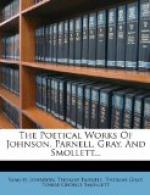In all Johnson’s works you see the traces of the triumphant conversationalist—of one who has met with few to contradict, and scarcely one to rival him. Hence the dogmatic strength and certainty, and hence, too, the one-sidedness and limitation of much of his writings. He does not “allow for the wind.” He seems to anticipate no reply, and to defy all criticism. One is tempted to quote the words of Solomon, “He that is first in his own cause seemeth just, but his neighbour cometh and searcheth him.” No such searching seems ever to have entered into Johnson’s apprehensions. His sentences roll forth like the laws of the Medes and Persians; his praise alights with the authoritativeness of a sun-burst on a mountain; summit; and when he blames, he seems to add, like an ancient doomster, the words, “I pronounce for doom.” With Burke, it was very different. Accustomed to parliamentary debate in its vicissitudes and interchange—gifted, too, with a prophetic insight into coming objections, which “cast their shadows before,” and with an almost diseased subtlety of thinking, he binds up his answers to opponents with every thesis he propounds; and his paragraphs sometimes remind you of the plan of generals in great emergencies, putting foot soldiers on the same saddles with cavalry—they seem to ride double.
This is not the place, nor have we room, to dilate on Johnson’s obvious merits and faults—his straight-forward sincerity—his strong manly sense—the masterly force with which he grasps all his subjects—the measured fervour of his style—the precision and vivacity of his shorter sentences—the grand swell and sonorousness of his longer; on his frequent monotony—his sesguipedalia verba—the “timorous meaning” which sometimes lurks under his “boldest words;” or on the deep chiaroscuro which discolours all his pictures of man, nature, society, and human life. We have now only to speak of his poetry. That is, unfortunately, small in amount, although its quality is so excellent as to excite keen regret that he had not, as he once intended, written many more pieces in the style of “London,” and the “Vanity of Human Wishes.” In these, the model of his mere manner is Pope, although coloured by Juvenal, his Latin original; but the matter and spirit are intensely his own. In “London,” satire seems swelling out of itself into something stronger and statelier—it is the apotheosis of that kind of poetry. You see in it a mind purer and sterner than Dryden’s, or Pope’s, or Churchill’s, or even Juvenal’s; “doing well to be angry” with a degenerate age, and a false, cowardly country, of which he deems himself unworthy to be a citizen. If there is rather too much of the saeva indignatio, which Swift speaks of as lacerating his heart, it is a nobler and less selfish ire than his, and the language and verse which it inspires are full of the very soul of dignity. In the “Vanity of Human Wishes,” he becomes one of those “hunters whose game




